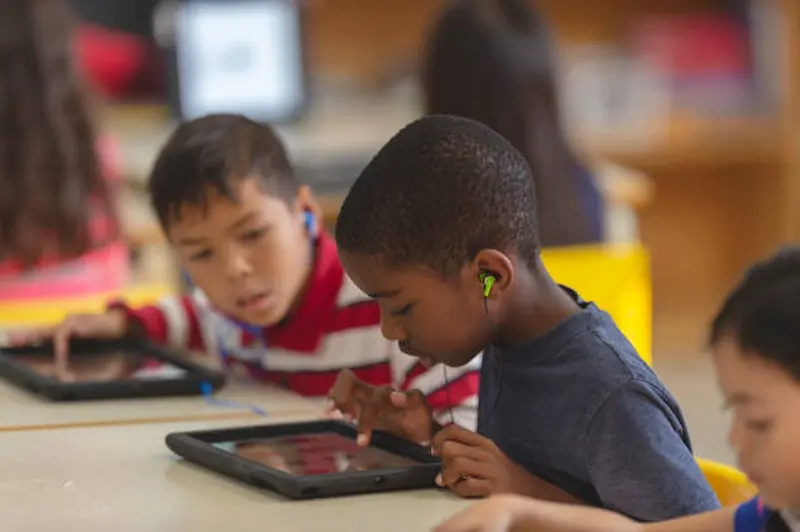Kindergarten learning websites for kids play a pivotal role in early childhood education, providing a foundation for essential skills. These platforms offer interactive and age-appropriate content, fostering cognitive development, literacy, and numeracy skills. Incorporating play and educational activities, these websites make learning enjoyable, helping children build a positive attitude toward education from the outset. In a digital age, these resources serve as valuable tools for parents and educators, complementing traditional learning methods and preparing young learners for academic success.
In this blog, we’ll explore the significance of kindergarten learning websites for kids, emphasizing their pivotal role in providing interactive and age-appropriate content. These platforms serve as engaging tools, fostering cognitive development and laying a strong foundation for essential skills in early childhood education.
Table of contents
Criteria for Selection:

A. Age-Appropriate Content: The first criterion involves ensuring that the educational games for kids cater to the specific developmental stage of the intended audience. Content should align with age-appropriate themes, challenges, and language to ensure comprehension and engagement.
B. Educational Value: The primary focus is on the educational merit of the games. They should align with learning objectives, promoting skill development, critical thinking, and subject-specific knowledge. The effectiveness of the game in contributing to the educational journey of the child is a key consideration.
C. User-Friendliness: The accessibility and usability of the games are crucial. A user-friendly interface ensures that both children and parents can navigate the platform easily, enhancing the overall learning experience and minimising frustration.
D. Safety Measures: Paramount in the digital age, safety measures include robust parental controls, secure data handling, and protection against inappropriate content. Ensuring a secure online environment is essential for creating a positive and protected space for children to explore and learn.
1. ABCmouse

ABCmouse is an educational website catering to young learners, offering a comprehensive platform for early childhood education. The site boasts interactive lessons, games, and activities covering various subjects, focusing on foundational skills such as literacy and math. Engaging animations and a structured curriculum create an immersive learning experience.
User Experience: ABCmouse provides a user-friendly interface, making navigation intuitive for both parents and children. Progress tracking, personalized learning paths, and parenting advice enhance the overall user experience.
Pros and Cons: Pros include diverse content and engaging activities. However, subscription costs may be a consideration, and the interface might be overwhelming for some users.
2. PBS Kids

PBS Kids stands as a prominent educational website dedicated to providing high-quality, age-appropriate content for children. With a focus on educational games, videos, and activities, PBS Kids offers a diverse range of content covering subjects like science for kids, math, and literacy. The platform is renowned for its trusted and educational programming.
User Experience: PBS Kids delivers a seamless user experience with an intuitive interface, facilitating easy navigation for children and parents alike. Safety features and a commitment to age-appropriate content contribute to a secure online environment.
Pros and Cons: Pros include its reputable content and diverse offerings. However, some users might desire more interactive elements in certain areas, and occasional ads could be a consideration.
3. Starfall

Starfall is a comprehensive educational website designed for early learners, focusing on foundational skills such as reading and mathematics. The site offers interactive activities, games, and songs that cater to different learning styles, promoting reading for kids and numeracy development. Its systematic approach progresses from basic concepts to more advanced skills.
User Experience: Starfall provides a user-friendly experience with its visually appealing interface and clear navigation. The structured curriculum ensures a seamless learning journey for young users.
Pros and Cons: Pros include a well-organized curriculum and engaging content. However, some users may desire more diverse subject coverage, and a subscription is required for access to certain features.
4. Funbrain

Funbrain is an educational platform that seamlessly blends entertainment with learning, catering to children from preschool to middle school. The site offers a diverse range of interactive games, books for kids, and videos covering subjects like math and reading. Its adaptive content adjusts to individual learning levels, providing a personalized educational journey.
User Experience: Funbrain excels in user experience with its colourful interface and intuitive navigation. Engaging content, coupled with a rewards system, creates an enjoyable learning atmosphere.
Pros and Cons: Pros include its versatility and adaptability. However, occasional ads may be a consideration, and some users may desire more advanced content for older age groups.
5. National Geographic Kids

National Geographic Kids is an educational platform that immerses children in the wonders of the world through captivating content and interactive activities. The site offers a diverse array of educational games, videos, and articles, including video games for kids, focusing on science, geography, and wildlife. With rich multimedia content, it inspires curiosity about the natural world.
User Experience: National Geographic Kids provides a visually appealing and user-friendly experience, ensuring seamless navigation for young learners. The site’s interactive elements enhance engagement and understanding.
Pros and Cons: Pros include its reputable content and visually stimulating materials. However, some users may find the subject matter more specialized, and occasional ads could be a consideration.
6. Coolmath4kids
Coolmath4kids is an educational website designed to make math enjoyable and accessible for children through a variety of interactive games and activities. The site offers a wide range of math-focused games, puzzles for kids, covering various concepts from basic arithmetic to more advanced topics. Its engaging approach aims to foster a positive attitude towards math learning.
User Experience: Coolmath4kids provides a user-friendly experience with its colourful and intuitive interface. The interactive nature of the content ensures that learning math becomes an entertaining adventure.
Pros and Cons: Pros include its focus on making math fun. However, some users may desire more diverse subject coverage, and occasional ads could be a consideration.
7. Sesame Street
Sesame Street’s online platform extends the beloved TV show’s educational legacy, providing a rich digital environment for young learners. The site offers a wide range of interactive games, videos, and activities for kids featuring iconic Sesame Street characters. Its content spans various subjects, focusing on literacy, numeracy, and social-emotional development.
User Experience: Sesame Street maintains a user-friendly experience, with an engaging and colourful interface designed for preschoolers. Interactive elements enhance the learning journey, aligning with the show’s educational goals.
Pros and Cons: Pros include its trusted educational content and familiar characters. However, occasional ads and limited advanced content might be considerations for some users.
Comparative Analysis

A. Common Features: Conducting a comparative analysis reveals shared attributes among these educational websites, such as interactive memory games for kids, age-appropriate content, and a focus on foundational skills in literacy and numeracy
B. Unique Features: Each platform boasts distinct offerings, with unique features ranging from specialised content, multimedia richness, to gamified learning approaches, catering to diverse learning styles and preferences.
C. Performance Comparison: By evaluating the platforms based on common and distinctive features, this analysis aims to provide a comprehensive performance overview, assisting parents and educators in selecting the most suitable educational resource tailored to their child’s individual needs and interests.
How to Maximize the Learning Experience

A. Creating a Schedule: Establish a consistent schedule to optimise the educational impact of online activities. Routine fosters a sense of structure, aiding children in understanding when it’s time for learning and when it’s time for other activities.
B. Parental Involvement: Actively engage in your child’s online learning journey. Discuss their progress, participate in learning games for kids together, and provide guidance when needed. Parental involvement enhances comprehension and reinforces the value of learning.
C. Balancing Screen Time: While online learning is valuable, maintaining a healthy balance is crucial. Combine digital activities with offline exercises to ensure a well-rounded educational experience, promoting both screen-based and hands-on learning.
Conclusion
Kindergarten learning websites for kids offer a plethora of benefits, providing a dynamic and interactive learning environment. These platforms engage young learners with age-appropriate content, fostering foundational skills in literacy, numeracy, and critical thinking. The gamified approach not only makes learning enjoyable but also instils a love for exploration and discovery. With accessible and diverse educational activities, these websites serve as valuable tools for parents and educators alike, promoting holistic development in the early stages of a child’s education.
To get your hands on more such articles, educational content, and free resources on coding for kids, robotics courses, game development, etc., check out the BrightCHAMPS Blog Page now!
Frequently Asked Questions ( FAQs )
A1. The availability of free features varies; some websites offer free content, while others may require subscriptions for full access.
Q2. Can Kids Use These Websites Independently?
A2. Many kindergarten learning websites are designed for independent use, offering user-friendly interfaces suitable for children to navigate.
Q3. How to Ensure Child Safety Online?
A3. Ensuring child safety online involves using parental controls, closely monitoring online activities, and teaching kids about responsible internet use.
Q4. Do These Websites Cover All Subjects?
A4. Yes, these websites typically cover a range of subjects, including literacy, numeracy, science, and more, providing a well-rounded learning experience.
Q5. Is There Offline Access?
A5. Offline access depends on the specific website; some platforms offer downloadable content for offline use, enhancing flexibility in learning environments.


 We are an army of educators and passionate learners from BrightChamps family, committed to providing free learning resources to kids, parents & students.
We are an army of educators and passionate learners from BrightChamps family, committed to providing free learning resources to kids, parents & students.












